Insight and Compassion Fuels Blackfeet Food Security Program
The Blackfeet Food Access and Sustainability Team (FAST Blackfeet) helps people living in poverty on the Blackfeet Reservation confront food insecurity head on. By providing recipes, nutrition classes and weekly access to meal staples and traditional foods – such as medicinal teas and local bison – at the Ō´yō´•ṗ´ Food Pantry, Global Volunteers’ partner is compassion in action. Read on to learn about the committed leaders who keep this model initiative a step ahead of local people’s ever-growing nutritional needs.
FAST Blackfeet Executive Director Danielle Antelope says her Bachelor’s Degree in sustainable food and bioenergy systems from Montana State University (MSU) isn’t her true qualification to lead the Blackfeet Reservation’s newest, and arguably most innovative nutrition program. It’s her childhood experience living on the poverty line.
“I’ve always shared that I know what it’s like to be food insecure. I know what it’s like to eat an unhealthy diet,” she says. The daughter of a single mother and sister to three siblings, Danielle said her mother’s salary as a school bus driver on the reservation put the family just $6 over the income limit for federal supplemental nutritional assistance, then known as food stamps. She ate the way most of her contemporaries ate at home, and the way most families on the reservation still eat – cheaper processed food with high fats, carbohydrates and salts. It took a toll on her health, and was what later drew her to her university area of focus.
“There were impacts on my physical, mental and spiritual health. I don’t blame my mom, because she stayed in the game. She did what she had to do. But, once I knew what this diet was doing to me physically and mentally, I decided I needed to change it,” she said. “When I was pregnant with my son, I thought, shoot, I have to make healthy meals for myself and him. I didn’t want to set my son up for being sick. So I learned and experimented with so many recipes when I was pregnant. My mom had no recipes to share with me, of course, so I went back to the traditional recipes that are healthy and my great-grandmother knew. This was the traditional diet of land-based foods such as berries, roots and wild game. The loss of hunting and gathering and reliance on government handouts caused people to be reliant on unhealthy foods, and led to modern food disparities.”
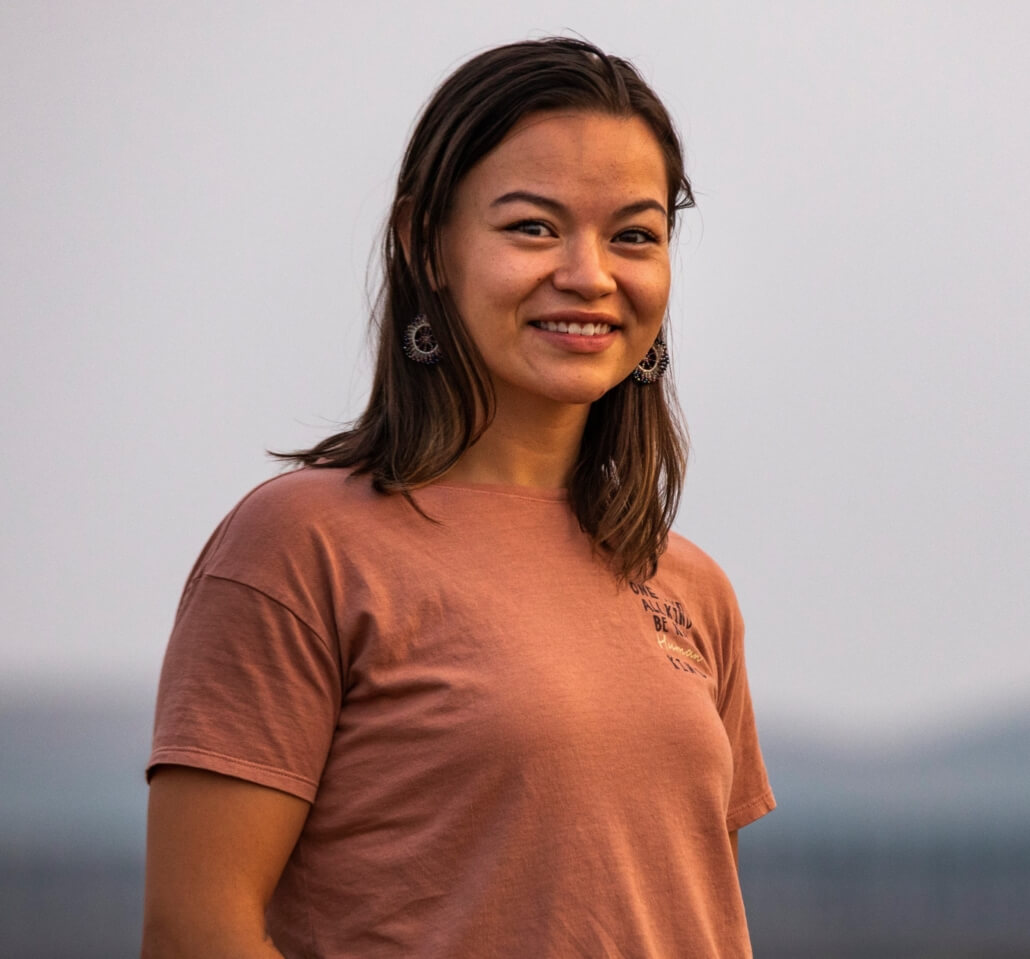
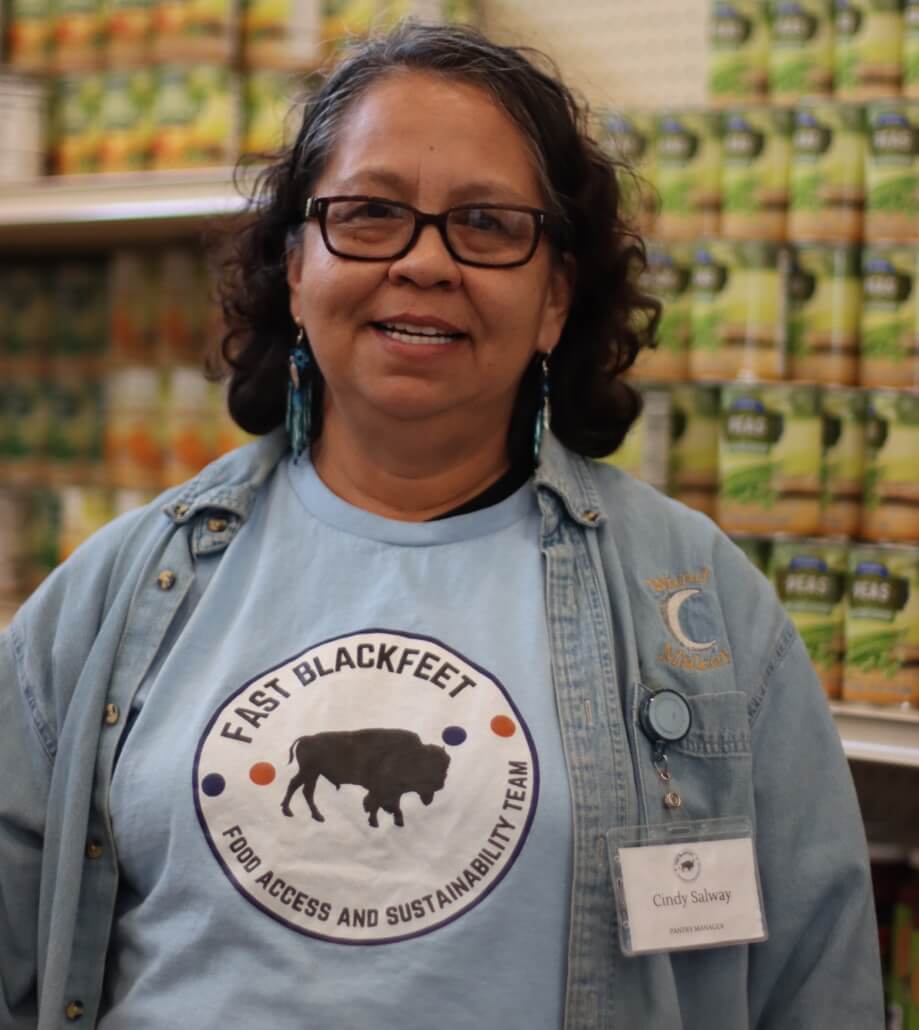
As she was preparing to transfer to MSU from Blackfeet Community College, the FAST Blackfeet Board of Directors was just forming for the newly created non-profit. She volunteered to be the co-chair while she attended school off the reservation to stay connected with the initiative. When she returned after graduating in the fall of 2021, she obtained a fellowship to pay her salary and became Executive Director. “We needed someone to lead the staff because the board was spending too much time doing that,” she explained. She dove straight into that role on March 16, 2022. The past year has been one of tremendous growth programmatically and in community participation.
She leads with her personal and academic nutritional expertise to inform her professional vision for the community. “I’m not going to be ashamed of what I went through as a kid. I’m going to use my experience to bring better nutrition to the community and enable FAST Blackfeet to provide what people need,” she asserts. “Being completely raw to the community I serve, they know I can relate to them. I saw my grandmother live with diabetes. My mother learned from her, and didn’t know how to prepare nutritious meals. But, my great-grandmother didn’t have diabetes, because she foraged and cooked with roots and natural foods. That’s what I bring to this role.”
The first service that FAST Blackfeet provides to the community is food access. Food insecurity (defined as not having access to food of an adequate quality to meet one’s basic needs) on the Blackfeet Reservation affects 69 percent of the population compared to the nationwide rate of 12.5. Food Pantry Manager Cindy Salway is responsible for procuring, storing and distributing 40,000 pounds of healthy food each month to needy families on the Blackfeet Reservation. She also oversees Global Volunteers’ teamwork packing meals, stocking inventory, and helping families shop for meals in the pantry.
“Having the Global Volunteers setting up for in-house distribution and making boxes for delivery is so helpful to us,” Cindy asserted. Global Volunteers has truly been our savior in providing the labor and experiences in this way,” she enthused. “I have learned from every team. Not only do they relieve our work load, they’re also a breath of fresh air when they share their home life or other volunteer experiences as we work together. They’ve shown me that we are not alone in our civic obligation!
Not that she needs reminding of that focus often. Her daily work puts her in the path of families who struggle each day with survival needs.
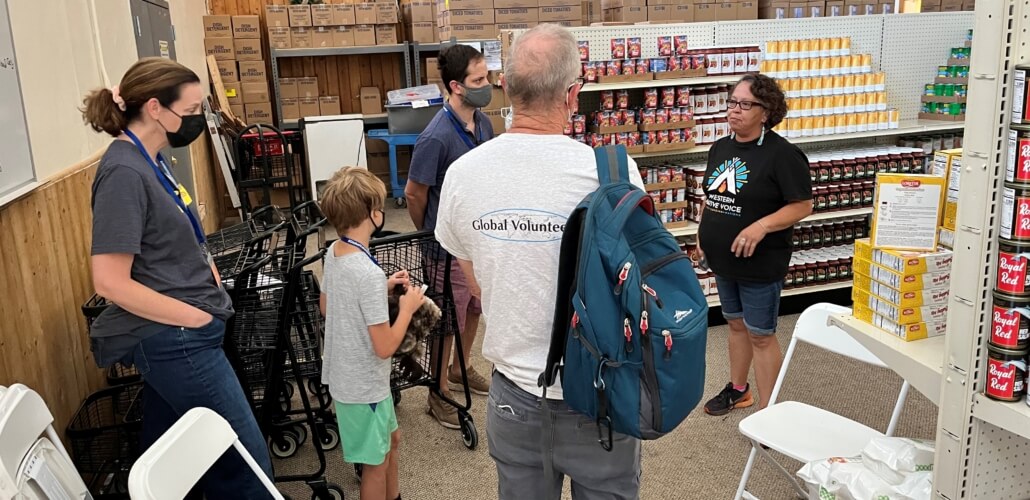
“Historical trauma is a big challenge for anyone working with the Blackfeet people,” Cindy explained. Of Blackfeet and Souix heritage, Cindy grew up off the reservation, but returned to her family’s land in her teen years. “Blackfeet are very reflective in their demeanor, the loss of loved ones, drug and alcohol abuse, and how traumas affect the people around them.” The impact of poverty is exacerbated in some ways by acceptance of these injustices, she said. Some people expect life to be hard, and give up challenging the people and circumstances causing hardships. FAST Blackfeet strives to return some of the power to people who might feel defeated and victimized.
Danielle expands on conditions leading to the current gap that FAST Blackfeet fills. As home to over 10,000 people, the Blackfeet Reservation is short on employment opportunities for family earners. Sometimes, for instance, a grandmother who’s raising her grandchildren might be working, but can’t afford enough healthy foods. Until FAST Blackfeet, she said, many people didn’t qualify for assistance from other programs in the area.
“When we created the food pantry, it was important it wasn’t income-based. We decided to make it need-based to provide access to healthy and culturally relevant food to those who truly need it,” referring back to her own childhood experience. “They don’t have to prove that they’re poor enough to use it.”
FAST provides meals to 500 families each week in the pantry in Browning, the main town on the reservation and through the Ō’yō’·ṗ’ on wheels mobile pantry which travels to 10 outlying reservation communities. “We create a safe environment for people to gather and receive food for themselves and their families, which is still very necessary to the wider community with the aftermath of Covid,” Cindy added. Further, the harsh winters complicate deliveries and limit operating hours for the pantry. So, demand rises as the weather improves and puts more pressure on volunteer services.
That’s why relying on Global Volunteers in the summer months when teams are on site is a massive relief, Cindy said. “At Ō’yō’·ṗ’, we have amazing local year-round volunteers who come lend a hand when available. However, with the amount of families we are now serving, we have a great need for more helping hands. We’re so happy when the first team of Global Volunteers arrives.”
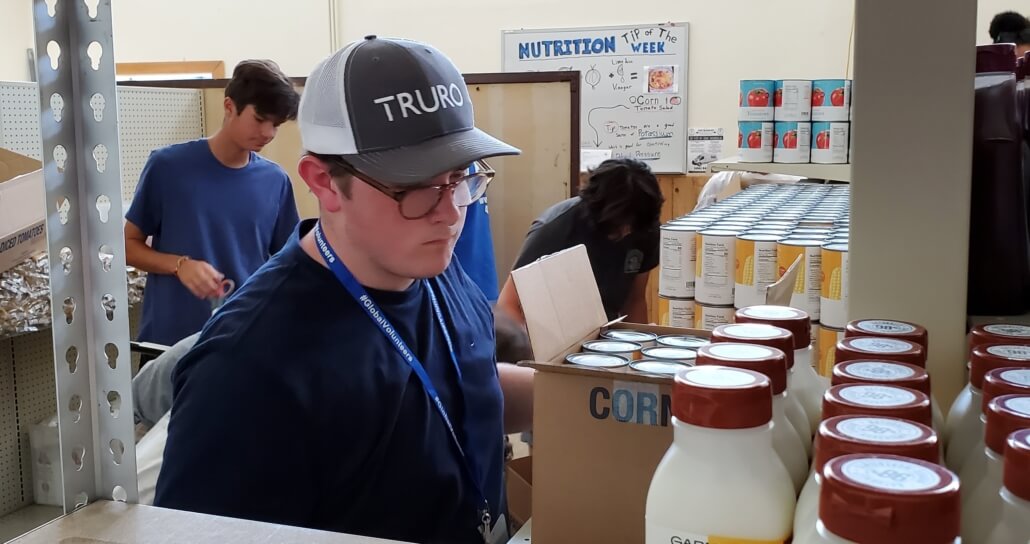
“But, we know we need to do more than only providing food,” said Danielle. “Nutrition education directed by a dietician was the next program we added. We provide healthy recipes and teach how to prepare healthy meals. I tell our staff, we can’t assume they know that information. If you gave those foods to my mom, she wouldn’t know what to do with them. We have to teach people how to prepare the food we supply for their daily meals. They need to know about healthy fats and what carbs do to your body. We try to help people make better choices.”
The foods in the pantry are labeled according to Healthy Eating Research (HER) guidelines for charitable organizations and come with featured recipes. The panty also supplies donated books on healthy cooking to prevent and control high blood pressure and diabetes, and fact sheets on traditional harvesting of local foods. Cindy continued: “The instilled cultural values of dedication to family and community and the underlying values of bravery and discipline is fundamental to our mission, and is what motivates me to continue to help others. These lessons were taught to me as a child and handed down throughout generations.”
They’ve even taken a page out of standard grocery retailer books. “Every Thursday, our nutritionist does cooking demonstrations and provides samples,” Danielle explains. “It’s crazy how people now come on Thursdays rather than Monday to shop so they can get the samples. It’s like Costco!”
Growing Health, FAST Blackfeet’s third program, “spun out of Covid,” Danielle says. “Our higher health disparities were spotlighted during the pandemic, and more people became interested in eating healthier to lower their risk. So, we took advantage of the new health interest. For instance, a grandma who raises her grandkids came into the pantry and asked about having medicinal teas in the pantry. It’s a traditional method for her health and wellness. So, I said, ‘Let’s find a way to have teas in the pantry.'”
They started with a survey of their clients, of whom 97 responded they’d like to have teas available to use for health and relaxation. “We bought different kinds of teas, and it was so popular, that we spent so much money to supply the community, we quickly realized it was unsustainable. No local market was able to handle our demand,” Danielle recounted.
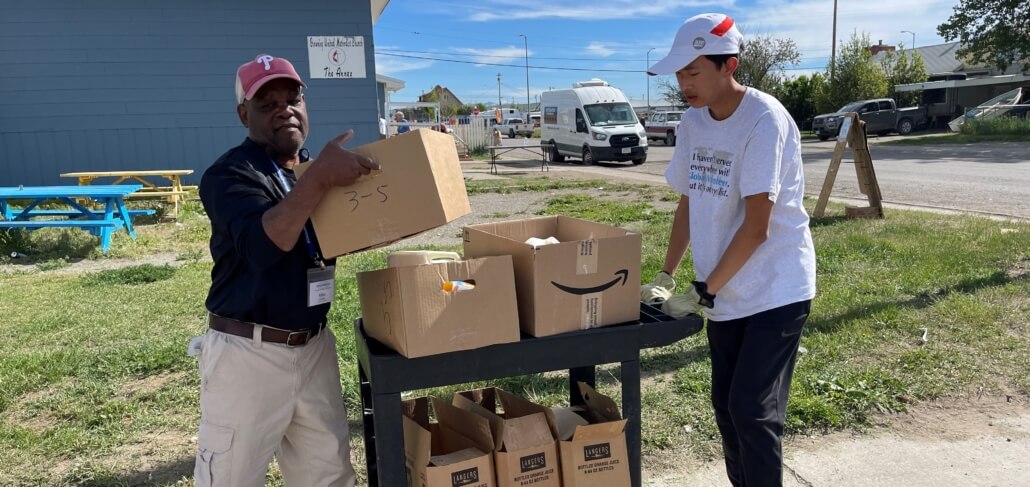
Growing Health, the program to produce tea and vegetable gardens, was born. In the pilot year of 2021, FAST Blackfeet began installing gardens for “aspiring tea producers” with an expectation that they would teach other community members how to successfully cultivate native herbs for tea. They recorded workshops with local knowledge holders and provided seasonal instructions. “We used the process everyone knows. My great-grandma taught my grandma, my grandma taught my mom, and my mom taught me,” said Danielle.
Peppermint, sage, yarrow, wild rose, bergamot, and raspberry are grown for tea. Some plants are wild harvested and transplanted, and others are purchased from the Center for Native Plants in Whitefish. All are native species, tolerant of the local climate.
“We work not to overwhelm new gardeners,” Danielle stresses. The first year is the tea garden – it’s their classroom. In the second year, they move up and get to do wild harvesting on the rez, in the Park and other places. Then, they can build on top of that knowledge.” Unexpected outcomes are that people have become very involved emotionally with their gardens, she said. “People have grieved with their gardens, and some have become more outdoorsey,” she said. “We figure that every one garden possibly impacts another five people – their friends, family, neighbors.”
“This is just the beginning of our mission,” Cindy asserts. “Sustainability is in our name and we have a great staff and board to make this happen.” Engaging Global Volunteers in this cornerstone project is emblematic of shared values and vision, she added.
Cindy says she can’t imagine a time when they won’t rely on volunteers’ hands-on help, easy compassion, and sense of purpose. In her reflective moments, she ponders how she can share more of Global Volunteers’ impact with the wider community. “My hope would be to get more of our community volunteers to learn from and maybe even bring the Global Volunteers’ knowledge to people who haven’t gotten to know them yet.” With up to 14 teams each summer serving on the reservation, she says, she’ll have many opportunities to pursue that goal.
“All the programs make me extremely happy,” Danielle reflects. “When we provide food access, we also teach consumers how to cook the food and where it comes from. That’s how we integrate all three components.”
“I’m excited about how my job reflects in my life, and my son. He loves to cook buffalo and drink tea. In my job, I realize I have to lead by example if I have any hope for others to adopt a healthy lifestyle. That’s how it all comes full circle.”

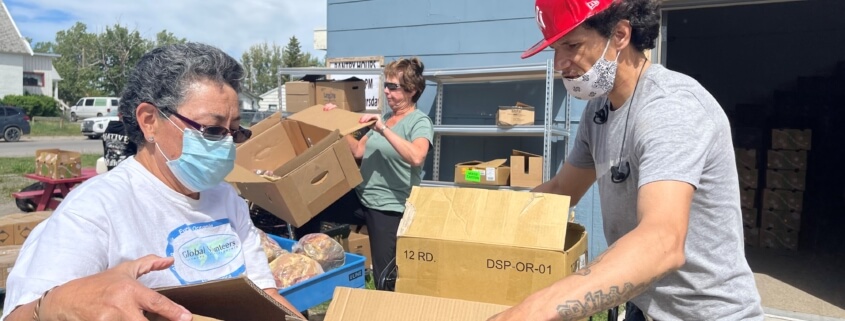


Leave a Reply
Want to join the discussion?Feel free to contribute!